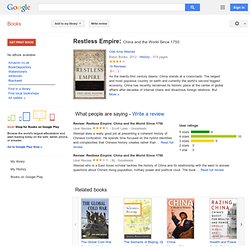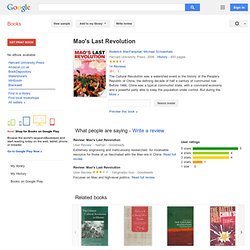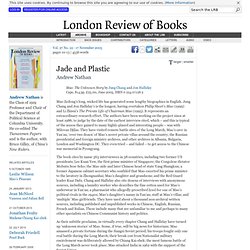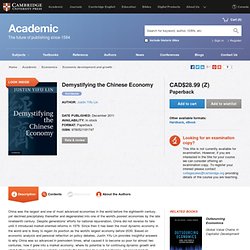

Sediments of Time 2 Part Set. China's Economy & economic development. The Politics of the Chinese Cultural Revolution: A Case Study - Hong Yung Lee. Restless Empire: China and the World Since 1750 - Odd Arne Westad. As the twenty-first century dawns, China stands at a crossroads.

The largest and most populous country on earth and currently the world’s second biggest economy, China has recently reclaimed its historic place at the center of global affairs after decades of internal chaos and disastrous foreign relations. But even as China tentatively reengages with the outside world, the contradictions of its development risks pushing it back into an era of insularity and instability—a regression that, as China’s recent history shows, would have serious implications for all other nations.
China's Political Economy in Modern Times: Changes and Economic Consequences, 1800-2000. The China Quarterly. Market and Institutional Regulation in Chinese Industrialisation, 1978-1994 - SOAS Research Online. Chinese Economic Development - Chris Bramall. Mao: The Unknown Story - Jung Chang, Jon Halliday. Mao's Last Revolution - Roderick MacFarquhar, Michael Schoenhals. The Cultural Revolution was a watershed event in the history of the People’s Republic of China, the defining decade of half a century of communist rule.

Before 1966, China was a typical communist state, with a command economy and a powerful party able to keep the population under control. But during the Cultural Revolution, in a move unprecedented in any communist country, Mao unleashed the Red Guards against the party. Tens of thousands of officials were humiliated, tortured, and even killed. Order had to be restored by the military, whose methods were often equally brutal. In a masterly book, Roderick MacFarquhar and Michael Schoenhals explain why Mao launched the Cultural Revolution, and show his Machiavellian role in masterminding it (which Chinese publications conceal).
After Mao’s death, in reaction to the killing and the chaos, Deng Xiaoping led China into a reform era in which capitalism flourishes and the party has lost its former authority. Andrew Nathan reviews ‘Mao’ by Jung Chang and Jon Halliday · LRB 17 November 2005. Mao Zedong’s long, wicked life has generated some lengthy biographies in English.

Jung Chang and Jon Halliday’s is the longest, having overtaken Philip Short’s Mao (1999) and Li Zhisui’s The Private Life of Chairman Mao (1995). It represents an extraordinary research effort. The authors have been working on the project since at least 1986, to judge by the date of the earliest interview cited, which – and this is typical of the access they gained to many highly-placed and interesting people – was with Milovan Djilas.
They have visited remote battle sites of the Long March, Mao’s cave in Yan’an, ‘over two dozen’ of Mao’s secret private villas around the country, the Russian presidential and foreign ministry archives, and other archives in Albania, Bulgaria, London and Washington DC. They even tried – and failed – to get access to the Chinese war memorial in Pyongyang. As their subtitle proclaims, in virtually every chapter Chang and Halliday have turned up ‘unknown stories’ of Mao. Uprising: Will Emerging Markets Shape or Shake the World Economy? Stephen Roach on the Next Asia: Opportunities and Challenges for a New Globalization. Demystifying the Chinese Economy. China was the largest and one of most advanced economies in the world before the eighteenth century, yet declined precipitately thereafter and degenerated into one of the world's poorest economies by the late nineteenth century.

Despite generations' efforts for national rejuvenation, China did not reverse its fate until it introduced market-oriented reforms in 1979. Since then it has been the most dynamic economy in the world and is likely to regain its position as the world's largest economy before 2030. Based on economic analysis and personal reflection on policy debates, Justin Yifu Lin provides insightful answers to why China was so advanced in premodern times, what caused it to become so poor for almost two centuries, how it grew into a market economy, where its potential is for continuing dynamic growth and what further reforms are needed to complete the transition to a well-functioning, advanced market economy. “Justin Lin’s Demystifying the Chinese Economy is a tour de force. Capitalism with Chinese Characteristics.
Capitalism with Chinese Characteristics Cambridge University Press 9780521898102 - Capitalism with Chinese Characteristics - Entrepreneurship and the State - By Yasheng Huang Copyright Information Sloan School of Management, Massachusetts Institute of Technology CAMBRIDGE UNIVERSITY PRESS Cambridge, New York, Melbourne, Madrid, Cape Town, Singapore, São Paulo, Delhi Cambridge University Press 32 Avenue of the Americas, New York, NY 10013-2473, USA www.cambridge.org Information on this title: www.cambridge.org/9780521898102 © Yasheng Huang 2008 This publication is in copyright.

First published 2008. Red Capitalism: The Fragile Financial Foundation of China's Extraordinary Rise.